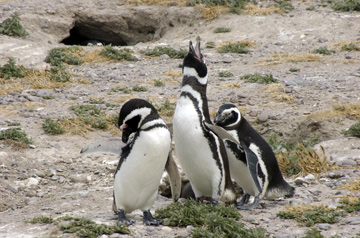New Park in Argentina Protects 500,000 Penguins
New Park in Argentina Protects 500,000 Penguins
mongabay.com
August 9, 2007
The government of Argentina will create a new marine park along the coast of Patagonia, reports the Bronx Zoo-based Wildlife Conservation Society. Located in Golfo San Jorge, the park will protect more than half a million penguins and other rare seabirds.
The announcement was made Thursday by President Nestor Kirchner of Argentina, the Governor of the Province of Chubut—Mario Das Neves—and by Argentina’s National Park Service.
“This decision represents a significant commitment by the government to protect one of the most productive and extraordinary marine ecosystems on the planet,” said Dr. Guillermo Harris, director of the Wildlife Conservation Society’s Argentina Program. “The creation of this park comes in the nick of time for many species that are threatened by the region’s fisheries and energy industry.”
 The penguins are happy. A group of Magellanic penguins in the new park. Photo credit: Graham Harris/Wildlife Conservation Society. |
The park, which includes 250 square miles (647 square kilometers) of coastal waters and nearby islands along nearly 100 miles (160 kilometers) of shoreline, is a nesting and feeding ground for about quarter million pairs of Magellanic penguin, representing roughly 20 percent of the entire species. The reserve also protects the only two nesting colonies of southern giant petrels on the entire Patagonian coast, as well as the only colonies of Southern American fur seals. Other resident species include the endangered Olrog’s gull, the white-headed steamer duck, and almost a quarter of all imperial and rock cormorants of Argentina.
WCS says that while the coastline is largely undeveloped, “wildlife is under pressure from a number of threats, including Argentina’s commercial shrimp industry.”
“Many birds become entangled in fishing nets, and oil pollution from tankers transporting petroleum from southern Patagonia to Buenos Aires and from expanding offshore oil drilling operations is a looming possibility,” the conservation group said in a statement.
This article uses quotes and information from a WCS news release.